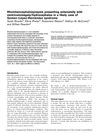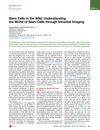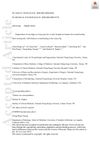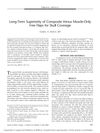
Search
for
Sort by
Research
240-270 / 666 results

research Accelerated Senescence in Skin in a Murine Model of Radiation-Induced Multi-Organ Injury
High-dose radiation speeds up aging in skin stem cells.

research Regulation of Hair Shedding by the Type 3 IP3 Receptor
The type 3 IP3 receptor is important for controlling hair loss and growth.

research Topical Use of Systemic Drugs in Dermatology: A Comprehensive Review
Using systemic drugs as creams for skin conditions shows promise, but more research is needed to confirm their effectiveness and safety.

research Skin Toxicity of Anti-Cancer Therapy
Anti-cancer treatments can cause reversible hair loss, skin sensitivity, pigmentation changes, nail damage, and skin reactions, with a need for more research on managing these side effects.

research Stimulatory Effect of Brazilian Propolis on Hair Growth Through Proliferation of Keratinocytes in Mice
Brazilian propolis was found to speed up hair growth in mice by increasing the growth of skin cells that form hair.

research Rhombencephalosynapsis Presenting Antenatally with Ventriculomegaly/Hydrocephalus in a Likely Case of Gomez–López-Hernández Syndrome
A 2-year-old boy with a rare brain malformation may have Gomez–López-Hernández syndrome.

research Follicular Dysplasia in Five Weimaraners
Five Weimaraners had a milder form of color dilution alopecia causing hair loss and skin issues.

research Anticonvulsant-Induced Cutaneous Reactions
Some anticonvulsant drugs can cause skin reactions, ranging from mild to severe, and managing these reactions is important for patient care.

research Biomedical Versus Cultural Constructions of Abnormality: The Case of Idiopathic Hirsutism in the United States
The perception of excessive hair growth in women as abnormal is more influenced by cultural norms than by medical reasons.

research Stem Cells in the Wild: Understanding Stem Cells Through Intravital Imaging
Intravital imaging helps us better understand stem cells in their natural environment and could improve knowledge of organ regeneration and cancer development.

research Cause of Androgenic Alopecia
Male pattern baldness may be caused by scalp pressure on hair follicles, which increases with age and leads to a cycle of hair loss. This process is not directly determined by genes.

research The G60S Connexin43 Mutant Regulates Hair Growth and Hair Fiber Morphology in a Mouse Model of Human Oculodentodigital Dysplasia
The G60S Connexin43 mutation causes hair growth issues and poor hair quality in mice, similar to human ODDD patients.

research Review of Factors Affecting the Growth and Survival of Follicular Grafts
Optimal storage solutions and effective additives are crucial for improving the survival of hair transplant grafts.

research Expression of the SCUBE3 Epidermal Growth Factor-Related Gene During Early Embryonic Development in the Mouse
Scube3 gene affects mouse embryo growth in multiple areas, but needs more research.

research Kawasaki Disease: An Update
Early treatment with immunoglobulin and aspirin reduces heart complications in children with Kawasaki disease.

research A Model System for Long-Term Serum-Free Suspension Organ Culture of Human Fetal Tissues: Experiments on Digits and Skin from Multiple Body Regions
Scientists developed a method to grow human fetal skin and digits in a lab for 3-4 weeks, which could help study skin features and understand genetic interactions in tissue formation.

research Female Pattern Hair Loss
Over 50% of women over 50 experience hair loss, with minoxidil being the only proven effective treatment.

research Oral Contraceptives as Anti-Androgenic Treatment of Acne
Birth control pills can help reduce mild to moderate acne in women.

research COVID-19 and Hypopituitarism
COVID-19 and hypopituitarism (reduced pituitary gland function) are linked, with the latter's related health issues potentially worsening COVID-19 outcomes, and COVID-19 possibly increasing risk for pituitary complications.

research Dental Derived Stem Cell Conditioned Media for Hair Growth Stimulation
Substances from dental stem cells might help treat hair loss.

research Regeneration of Rete Ridges in Lanyu Pig (Sus Scrofa): Insights for Human Skin Wound Healing
Lanyu pigs show that partial-thickness wounds can partially regenerate important skin structures, which may help improve human skin healing.

research Top Ten Clinical Pearls in the Treatment of Acne Vulgaris
Start acne treatment early to prevent scarring, consider antibiotic resistance, use maintenance therapy, and manage side effects carefully.

research Current Indications of Low-Level Laser Therapy in Plastic Surgery: A Review
Low-Level Laser Therapy may help with flap survival and burn scar healing, but not with venous ulcers or hair loss, and more research is needed.

research Radiation- and Chemotherapy-Induced Permanent Alopecia: Case Series
Some cancer treatments can cause permanent hair loss.

research A Japanese Case of Ichthyosis Follicularis with Atrichia and Photophobia Syndrome with an MBTPS2 Mutation
A Japanese patient with IFAP syndrome had a severe MBTPS2 gene mutation but showed milder symptoms than previously observed cases.

research Long-Term Superiority of Composite Versus Muscle-Only Free Flaps for Skull Coverage
Composite flaps are better than muscle-only flaps for long-term skull coverage.

research Mesenchymal Stem Cells From Mouse Hair Follicles Reduce Hypertrophic Scarring in a Murine Wound Healing Model
Mouse stem cells from hair follicles can improve wound healing and reduce scarring.

research Beta-Catenin–Dependent Wnt Signaling: A Pathway in Acute Cutaneous Wounding
The study found that a specific signaling pathway helps skin wounds heal faster but may lead to larger scars.

research Banding Pattern on Polarized Hair Microscopic Examination and Unilateral Polymicrogyria in a Patient With Steroid Sulfatase Deficiency
A patient with steroid sulfatase deficiency had a unique hair pattern and a brain malformation not previously linked to the condition.